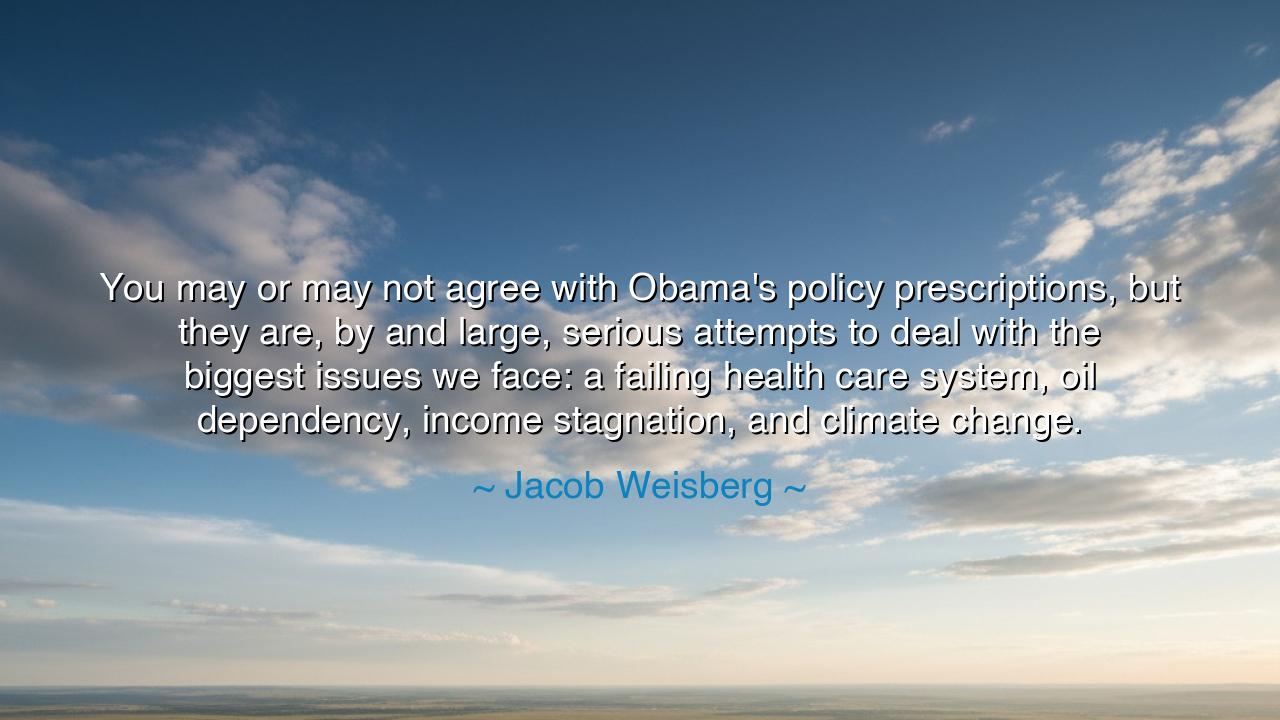
You may or may not agree with Obama's policy prescriptions, but
You may or may not agree with Obama's policy prescriptions, but they are, by and large, serious attempts to deal with the biggest issues we face: a failing health care system, oil dependency, income stagnation, and climate change.






“You may or may not agree with Obama’s policy prescriptions, but they are, by and large, serious attempts to deal with the biggest issues we face: a failing health care system, oil dependency, income stagnation, and climate change.” Thus spoke Jacob Weisberg, a chronicler of modern governance, whose words ring not only as political observation but as timeless truth. For beyond the name of Obama, beyond the age of policies and debates, lies an enduring message: that the worth of a leader is not in the perfection of his ideas, but in the earnestness of his attempt to confront the storms that besiege his people. This is the essence of leadership—to strive toward healing, even when the cure is uncertain.
In every age, there are those who cry out for perfection, who demand that the leader walk unerring upon the narrow bridge of public approval. But history teaches otherwise: that true leadership dwells not in flawless wisdom, but in courageous intention—the will to face the vast, complex, and often unsolvable problems of humankind. Obama’s efforts, as Weisberg reminds us, were not idle speeches, nor shallow gestures for the favor of the crowd. They were acts of confrontation against the deep maladies of a nation—illness, dependency, inequality, and the fever of the Earth itself. Whether one agrees or not, the seriousness of that endeavor commands respect, for it is far easier to criticize than to build, far easier to sneer from the shadows than to labor under the weight of responsibility.
Consider the mighty Marcus Aurelius, emperor and philosopher, who ruled a Rome shaken by plague, rebellion, and war. Many of his choices were doubted, some condemned, yet his writings reveal the eternal struggle of a man who sought reason amid chaos, virtue amid decay. He did not claim divine perfection; he sought only to act rightly in a world of imperfection. And so too did Obama, though of another empire and another age. He faced not legions and barbarians, but the unseen forces of economy, ideology, and climate—foes no less formidable. His policy prescriptions were attempts to mend, not to conquer; to heal, not to boast. To attempt such things, knowing the tide of opposition, is itself a mark of rare courage.
The ancients understood that the measure of a statesman lies in his devotion to the collective good, not the acclaim of the moment. A ruler who seeks applause is like a sailor steering by lightning; he may see flashes of light, but he will never find true north. The serious attempt—the honest grappling with the great burdens of one’s time—is what sets apart the leader from the demagogue, the healer from the pretender. Weisberg’s words remind us to look beyond the noise of argument, beyond the fleeting passions of politics, to see the heart of intention. For intention is the seed of all enduring good.
Yet there is a deeper current here, one that flows through the soul of every citizen. The quote speaks not only of Obama, but of us all—for every generation faces its own health crises, dependencies, inequalities, and wounds upon the Earth. The lesson is universal: to confront problems with seriousness, not denial; with effort, not apathy. Whether one governs a nation or merely one’s own life, the principle is the same—act with sincerity, guided by truth, and let your striving be your honor.
Remember also the wisdom of Solon, the great Athenian lawgiver, who once said, “I gave the people not the best laws, but the best they could bear.” In this humility lies the same truth that Weisberg saw in Obama: that governance is not the art of pleasing all, but of balancing vision with reality, compassion with prudence. The wise leader knows that perfection is a myth, yet the attempt—steady, serious, and sincere—is divine. Thus must we too learn to act earnestly in our own realms, without waiting for ideal conditions or universal praise.
So, what can we learn? To approach our challenges—personal or collective—with serious intent. Do not wait for certainty before you begin. When health fails, seek healing. When injustice rises, confront it. When the Earth groans beneath the weight of consumption, live lightly. For in striving sincerely, we become part of the lineage of those who dared to heal the world in their own small ways.
Therefore, let this truth be passed down as a sacred counsel: you may agree or disagree with the actions of leaders, but honor always the spirit of those who attempt in earnest to mend what is broken. For in a world quick to scorn and slow to act, it is the sincere, not the flawless, who move history forward. Strive, then, with seriousness of heart, and let your deeds—like theirs—bear witness to your courage to care.






AAdministratorAdministrator
Welcome, honored guests. Please leave a comment, we will respond soon